Key takeaways:
- Effective collaboration and open communication among crew members are essential for successful film production.
- Meticulous pre-production planning significantly shapes a project’s foundation and helps avoid chaos during shooting.
- Flexibility in the production process allows for creative spontaneity and can lead to unexpectedly positive outcomes.
- Thorough reflection on project successes and failures fosters personal growth and improves future filmmaking endeavors.
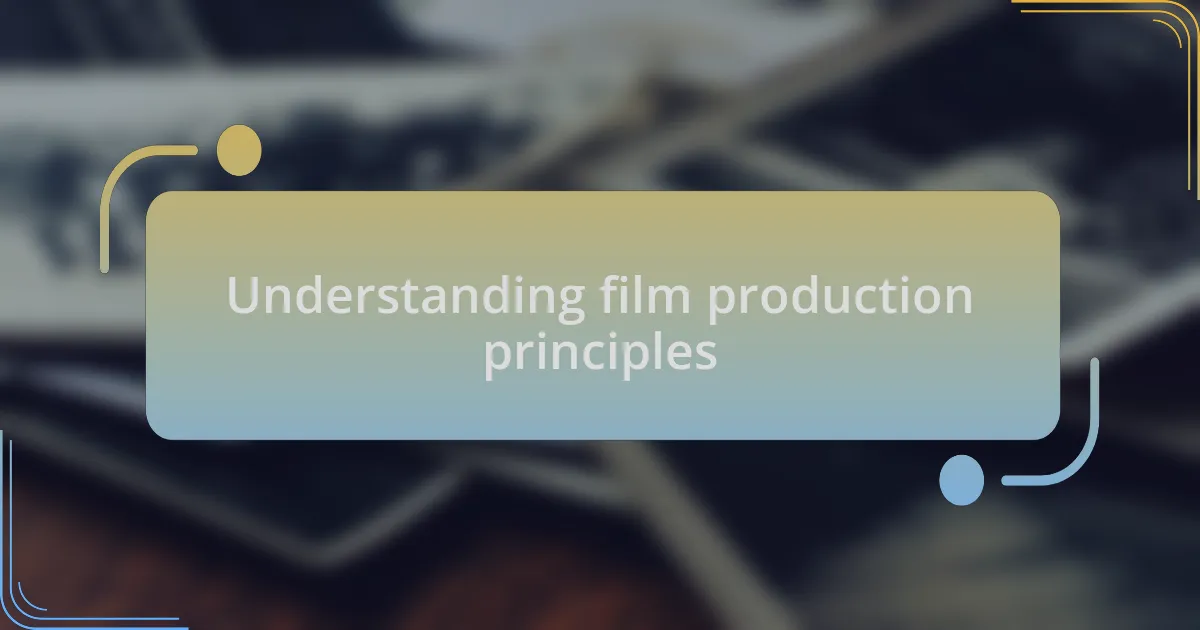
Understanding film production principles
Understanding the principles of film production starts with recognizing that every successful project hinges on effective collaboration. In one of my earlier projects, I encountered a situation where lack of communication led to confusion on set. Have you ever felt that frustration when everyone seems to be on a different page? I learned then that fostering open dialogue among crew members, from the director to the grips, can transform chaos into harmony.
Another principle that stands out is the importance of pre-production planning. I vividly remember the late nights spent in brainstorming sessions, meticulously laying out each scene. It was during those moments that I realized how preparation truly shapes the foundation of any film. Can you imagine diving into a shoot without a solid plan? The chaos that follows can be overwhelming, reinforcing the idea that a well-thought-out pre-production phase is non-negotiable.
Finally, embracing flexibility within the production process proved to be crucial. On one particular shoot, unforeseen weather forced us to rethink our entire shooting schedule. Instead of panicking, we adapted quickly and ended up capturing some truly stunning footage. How often do we cling to our original visions instead of allowing creative spontaneity to unfold? This experience taught me that being open to change can lead to unexpected and beautiful results in film production.
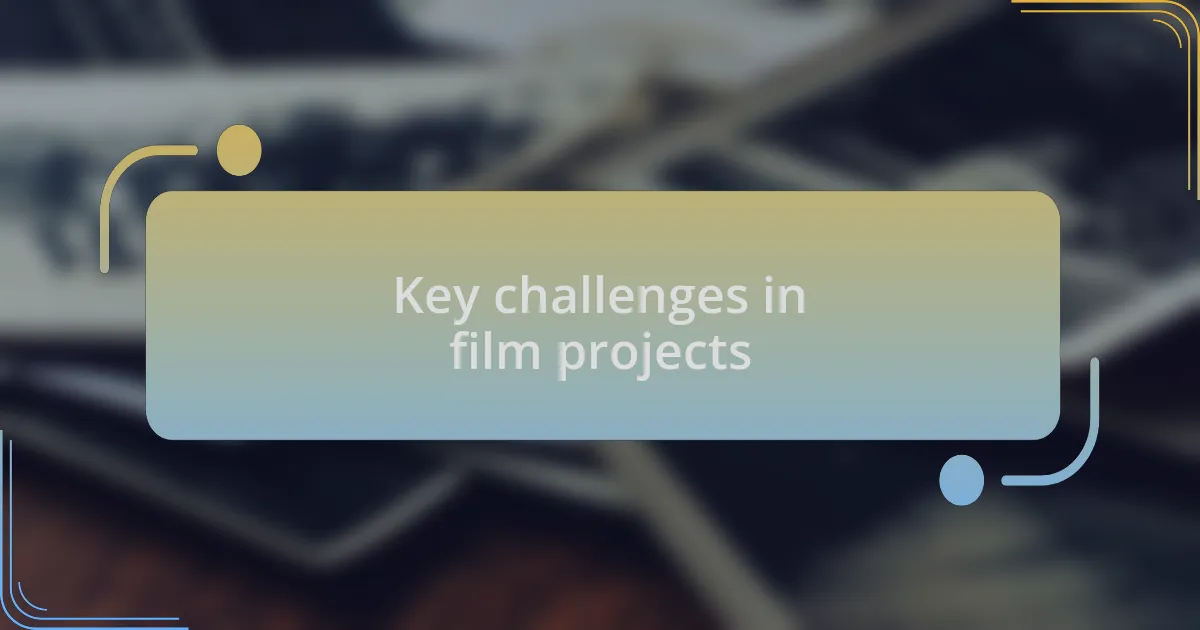
Key challenges in film projects
One of the most significant challenges I’ve faced in film projects is balancing time and budget constraints. In a short film I directed, we underestimated the time needed for certain scenes, leading to rushed shoots that compromised the quality of our work. Have you ever experienced that sinking feeling when you realize you’re racing against the clock? It taught me that meticulous scheduling is vital but maintaining a flexible budget for unexpected costs can be just as important.
Another key challenge is managing the diverse personalities within a crew. I recall a particularly intense moment on set when two team members clashed over creative differences, threatening to derail our progress. It made me realize how critical it is to address interpersonal conflicts promptly. How do you navigate tensions when everyone is passionate about their vision? Establishing a collaborative environment where everyone feels heard can often turn potential disputes into opportunities for innovation.
Lastly, sourcing and coordinating the right locations can be a logistical nightmare. During one production, we secured what seemed like the perfect location, only to find out it was double-booked last minute. That moment of panic quickly turned into a scramble to find an alternative that met our vision. It was a stark reminder that location scouting should be as rigorously planned as shooting schedules. How often do we overlook this crucial step? Ensuring contingency plans are in place for location setbacks can save you from a lot of heartache down the line.
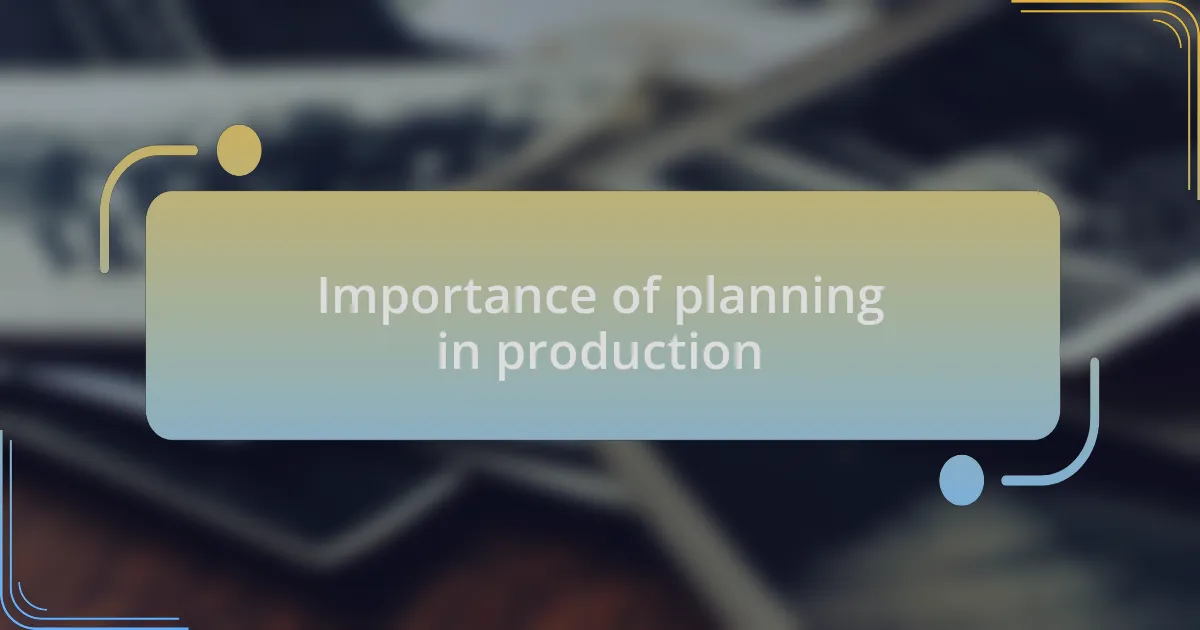
Importance of planning in production
In my experience, meticulous planning is the backbone of a successful film production. I recall a project where we decided to skip detailed pre-production meetings, thinking we could wing it on set. The result? A disorganized shoot that left everyone feeling frazzled and frustrated. Have you ever felt the stress of scrambling to find answers during filming? Proper planning not only keeps the crew aligned but also allows space for creativity to flourish.
Budgeting, an essential part of planning, often gets overlooked. In one instance, we carefully mapped out our expenses but didn’t account for last-minute equipment rental fees. It turned into a stressful ordeal as we revised our budget on the fly. This taught me the significance of including a buffer in the budget for unforeseen costs—it’s a game changer that affects how smoothly a production runs. How many times have you felt the sting of an unexpected expense? Planning helps us anticipate those surprises, keeping the creative process running more smoothly.
Taking the time to sketch out logistics can vastly improve the overall experience of production. I learned this when we coordinated a multi-location shoot without a clear framework. A simple miscommunication led to a crew member arriving hours late, causing a domino effect of delays. That taught me the necessity of clear communication and a well-structured plan. Isn’t it frustrating when a small issue spirals into a massive hurdle? Good planning is the invisible force that helps us sidestep such pitfalls.
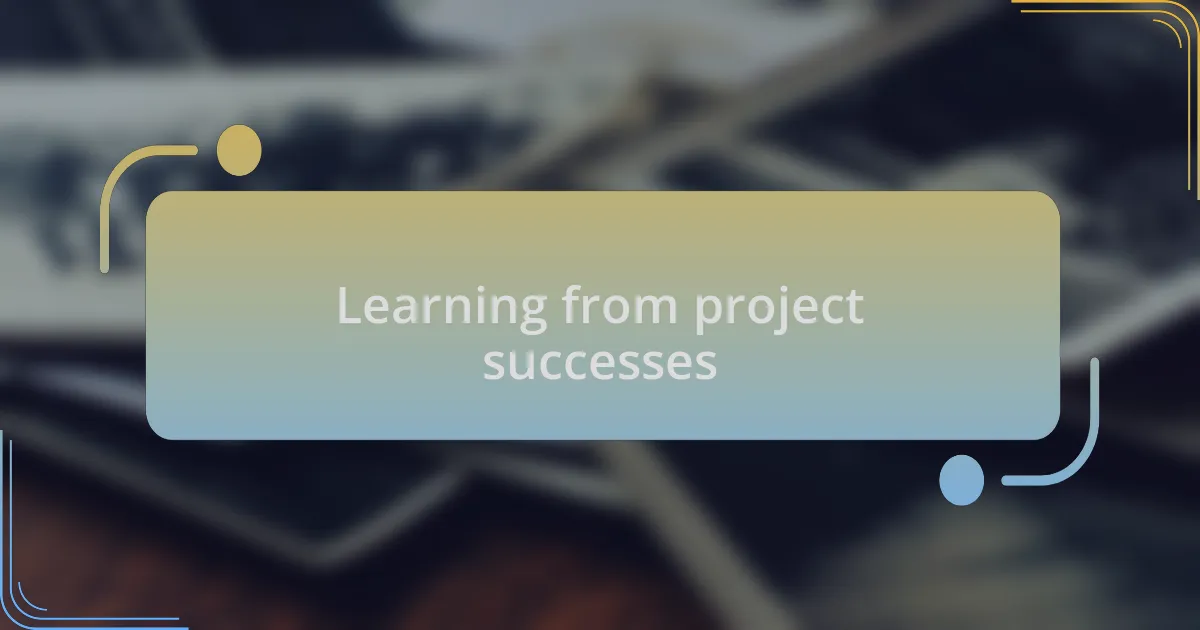
Learning from project successes
Recognizing the triumphs of completed projects can often illuminate the path to future successes. I remember a short film we produced that turned out to be a festival darling. We made it a point to evaluate what went right during post-production—like the effective use of sound design and editing pacing. This reflection helped us understand the power of those elements in enhancing storytelling. Have you ever reviewed a successful project and realized how vital specific details were in creating that magic?
Moreover, celebrating success allows for a deeper appreciation of collaborative efforts. During one particular documentary, the synergy between our cinematographer and director was nothing short of remarkable. We took time after the film premiered to discuss how our strengths complemented each other, which fostered not just camaraderie but also innovation. I often wonder, how would projects look if we actively focused on our strengths instead of only critiquing weaknesses? It’s a mindset shift that invigorates not just our group dynamics but the art itself.
Lastly, learning from success isn’t merely about the film; it’s about personal growth. After finishing a project I was particularly proud of, I found myself reflecting on the leadership skills I had developed along the way. I realized that fostering an inclusive environment where everyone’s voice counted dramatically impacted our outcome. This experience led me to ask, how can we cultivate such environments in future projects? That’s a question worth considering, as it drives not just project success but also nurtures talented individuals eager to create.
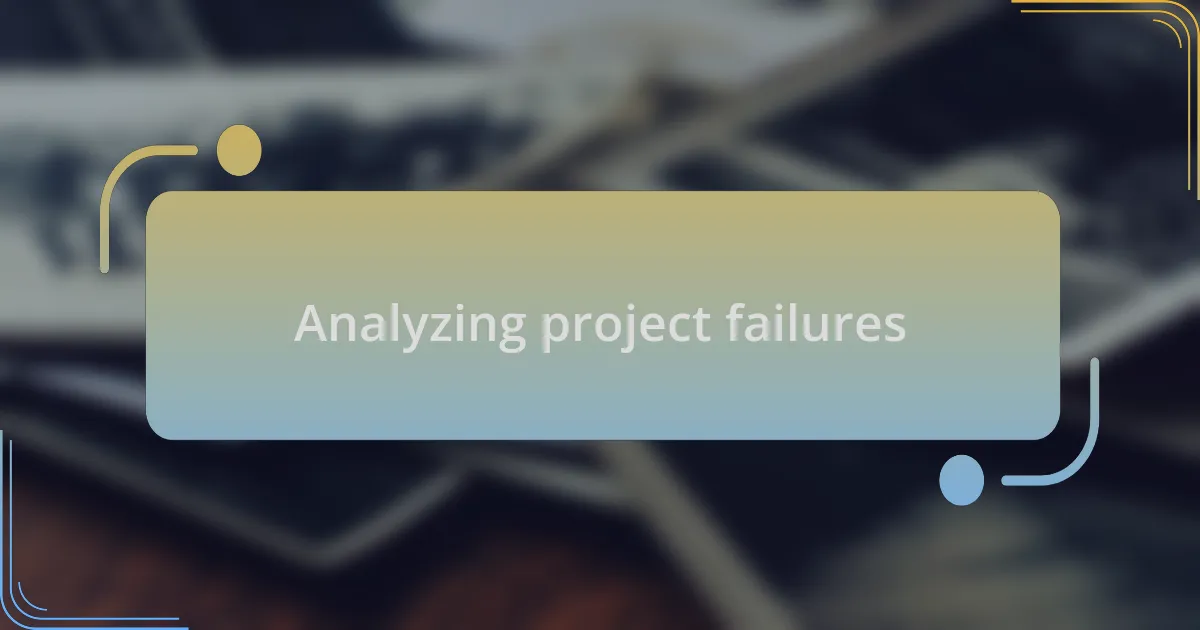
Analyzing project failures
Analyzing project failures is often just as illuminating as celebrating successes. I recall a particular indie film we produced where everything seemed to go wrong. From miscommunication in the script to a last-minute actor drop-out, it became a pivotal learning experience. Reflecting on these setbacks led me to ask: what systems can we put in place to ensure smoother communication moving forward?
One profound takeaway from that project was understanding the importance of pre-production planning. We overlooked vital aspects, like thorough rehearsals and crew meetings, which, in hindsight, could have prevented many of the issues we faced. I remember feeling a mix of frustration and disappointment, prompting me to realize that every detail matters. Have you ever experienced a project where missing small elements derailed your timeline?
Additionally, embracing failures can enhance team resilience. After the chaotic completion of that project, we took the time to regroup and discuss our shortcomings openly. It was cathartic to share feelings of unease and frustration, but even more rewarding to collectively brainstorm solutions. This was a turning point, prompting me to wonder: how can fostering such vulnerability and openness lead to a stronger, more cohesive team in future endeavors?
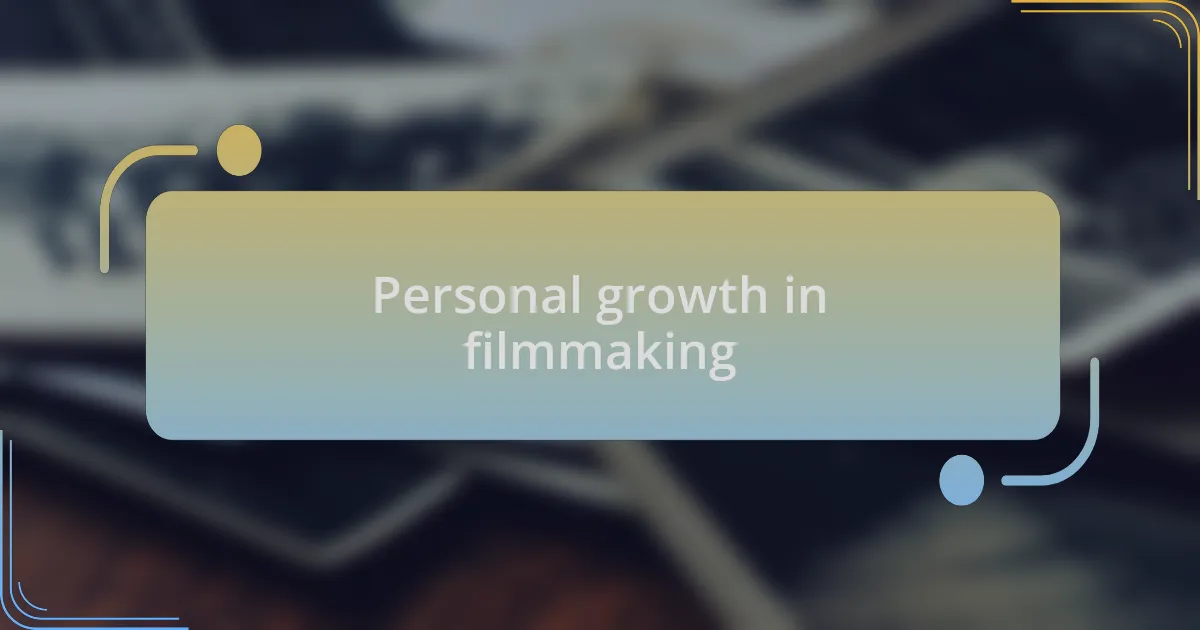
Personal growth in filmmaking
Personal growth in filmmaking often stems from the moments that challenge our creative instincts. I remember a short film project where I had to direct a scene I felt completely out of my depth handling. The anxiety of stepping outside my comfort zone was palpable, yet it was in that struggle that I discovered the power of collaboration. When I opened up to my cinematographer about my concerns, we brainstormed together and ultimately crafted something that exceeded my expectations. Have you ever found yourself facing a similar creative block, only to realize that sharing your vulnerability can lead to unexpected breakthroughs?
Through each project, I’ve learned that flexibility is vital. I once had a detailed storyboard ready for a dramatic scene, but on the day, the location fell through. Instead of clinging to my original vision, I embraced the change and allowed the actors’ improvisation to guide the new path. That spontaneous decision not only salvaged the day but also ignited a freshness in our storytelling. It made me ponder: how often do we limit ourselves by rigidly adhering to our initial ideas?
Moreover, I’ve come to value the emotional evolution that occurs on set. I recall working with a passionate young actor who was nervous about their performance. Watching their progression from fear to confidence reminded me of my early days in front of the camera. It reinforced my belief that personal growth isn’t just an individual journey; it’s a collective experience. Can we foster environments where everyone feels safe to grow, learn, and express themselves artistically together?
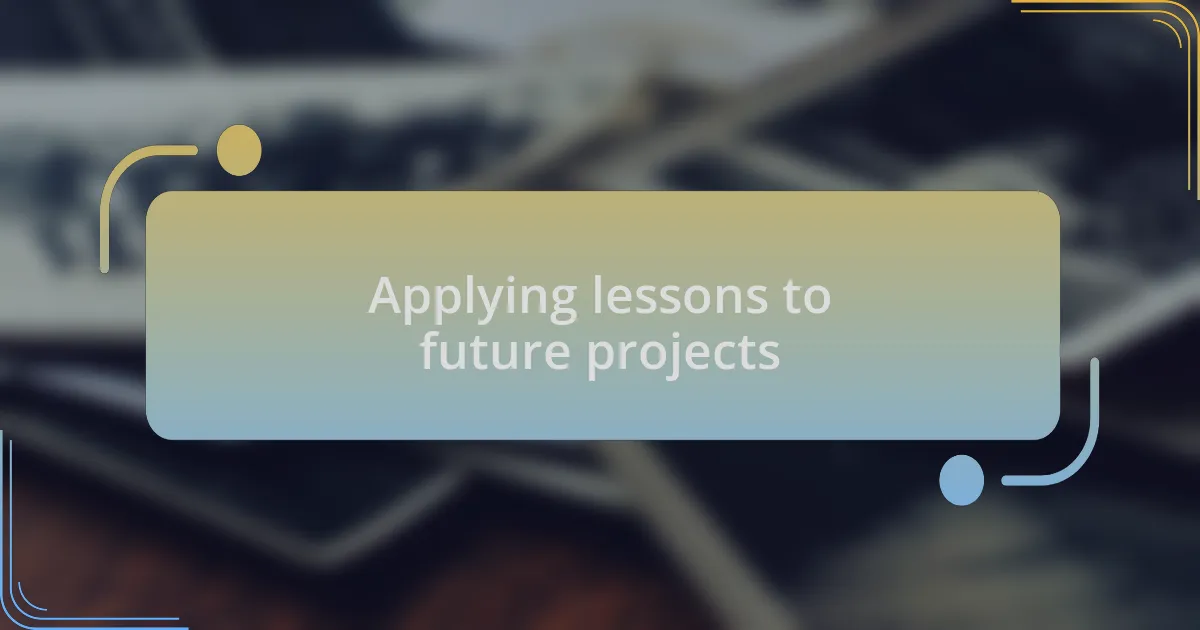
Applying lessons to future projects
Applying the lessons learned from past projects often feels like having a personal toolkit ready for future endeavors. I remember a time when a lack of clear communication led to a chaotic shoot, where everyone was working towards different visions. That experience taught me to prioritize regular check-ins with my team. Now, I find that laying a solid foundation with open dialogue not only clarifies everyone’s roles but also stirs a sense of shared purpose. Have you noticed how a well-aligned team can elevate a project to unexpected heights?
Reflecting on a particularly intense shooting week, I learned the importance of pacing myself and my crew. We were under tight deadlines, and I pushed everyone, including myself, to the limit. The results were great, but the atmosphere became tense. Now, I understand that maintaining a healthy balance between productivity and morale is crucial. It makes me wonder, how can we create an environment where creativity thrives without the weight of pressure? Balancing urgency with creativity has become a guiding principle in my productions.
Additionally, my past experiences have reinforced the need for thorough prep work before diving into a new project. I once jumped into shooting with minimal rehearsal, thinking spontaneity would spark magic. The end product felt disjointed, lacking the cohesive touch I envisioned. Now, I always invest time in rehearsals, as they help cultivate chemistry and ease any nervousness, creating a richer tapestry of performance. How often do we underestimate the power of preparation in our artistic journeys?